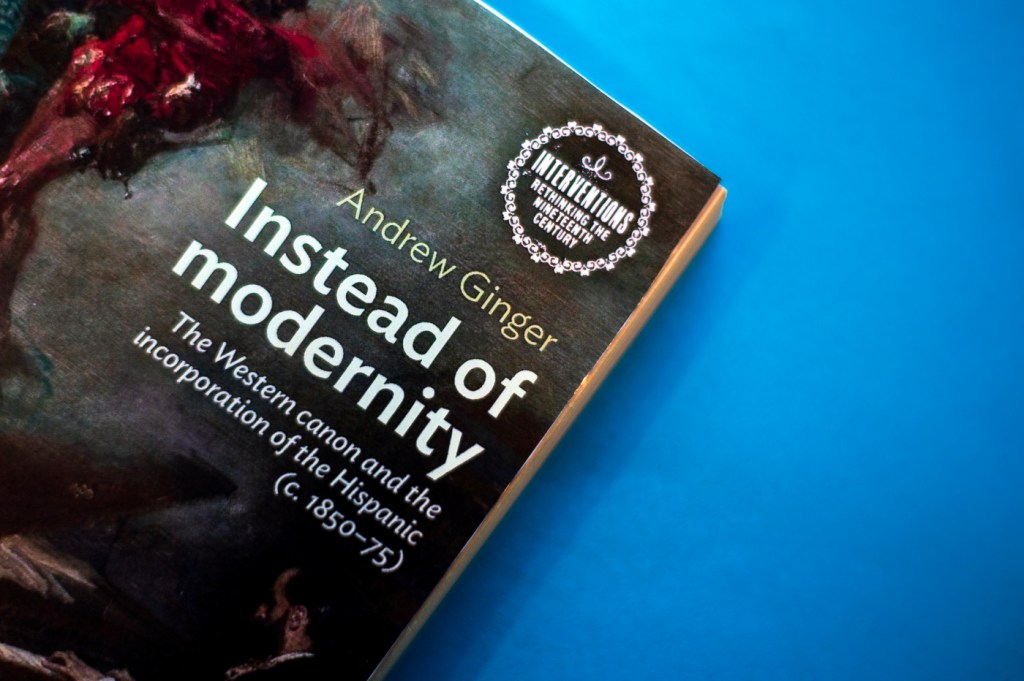Painting a more complete picture: How a Northeastern historian is revealing the hidden complexity behind ‘modernity’
Vice provost for international engagement Andrew Ginger’s book “Instead of Modernity” reveals how the Hispanic world has been overlooked in studies of the modern period — unsettling the concept of “modernity” itself.

When we consider the “modern” world, we might think about current events, recent advances in technology or the latest political upheaval.
But when historians talk about “modernity,” they usually mean something very different — and specific. Andrew Ginger says that modernity arises around “a point of rupture, a change in the middle of the 19th century” that has had ripple effects into the present.
With his book “Instead of Modernity: The Western Canon and the Incorporation of the Hispanic,” Ginger argues for a more inclusive conception of history, one that welcomes diverse contributions from a global perspective and that troubles the cohesive view of any single period.
Ginger, who is the vice provost for international engagement and a professor of comparative studies at Northeastern University London, says that historical periodization is a tricky thing, with the tendency to oversimplify the story of how events really unfolded.
The story of modernity is “actually a story of exceptionalism and rupture,” he says, “that these are special people in special places in time who come up with this world transforming vision. The story is that they alone get rid of the idea of an eternal human nature, a human who is at the center of history and the planet.”
“But, in fact, that’s not the way things are at all.”
Take, for example, the Spanish empire, one of the major Atlantic powers from the 15th century all the way into the 18th and 19th centuries.
But by the middle of the 19th, Ginger says, Spain seems to have dropped off the radar of many historians. “If we go back a couple of centuries,” he continues, Spain in many capacities prepares “the way for the modern world. They create transoceanic commerce with the Americas, they create — what people call — the capitalist system that goes with that. They create many aspects of the bureaucratic modern state, both in Spain and across Europe.”
Featured Posts
But despite these contributions, “the torch of history is kind of passed to the Brits, to the Germans, to the French and, in due course, to the U.S.
“The Spanish [are] shut out of this modernity thing.”
But this is radically oversimplifying things, Ginger argues in “Instead of Modernity,” and by including the people and places marginalized by history (and historians), the overall picture of history becomes richer — and more complex.
In the visual arts, Ginger notes, the French painter Édouard Manet “was trying to imagine a kind of new world” within his medium.
But there were other artists, too, changing the way painters approached their medium, and in different ways. The Spanish painter Eugenio Lucas was “concerned with human beings as products of history.”
Labeling both artists “modern” would seem to align these two practices, but Ginger says that their attitudes were “contradictory and completely different.”
“What happens if you put [Hispanic cultures] back in the story?” Ginger asks.
Many of the categories that nest under the umbrella of modernism, Ginger says, “start to get into quite deep trouble,” especially the category “modernity” itself.
“When you start introducing comparisons with people from these other places,” he says, “it’s really not clear where you’re supposed to draw the line of what’s included and what’s excluded. If that line’s not clear, then the term ‘modernity’ isn’t much use.”
Aiming to increase the sum of what’s included in historical breadth, “Instead of Modernity” combines examinations of literature and the visual arts with other products of culture like taxidermy, optical toys and political theory, to name just a few.
Of course, Spain, Latin America and the rest of the Hispanic world aren’t the only places whose contributions have been ignored at different moments in history, but Spain’s prevalence as a global power, followed by its relatively sudden sidelining, has a “specific resonance” that makes it a valuable subject, Ginger says.
“We could ask the same question of other parts of the world,” each of which would deepen our understanding of how the past actually proceeded.
Ginger says that the goal of his book comes down to “opening up a gap and making new connections.”
A paperback edition of “Instead of Modernity: The Western Canon and the Incorporation of the Hispanic” has just been released through Manchester University Press.










